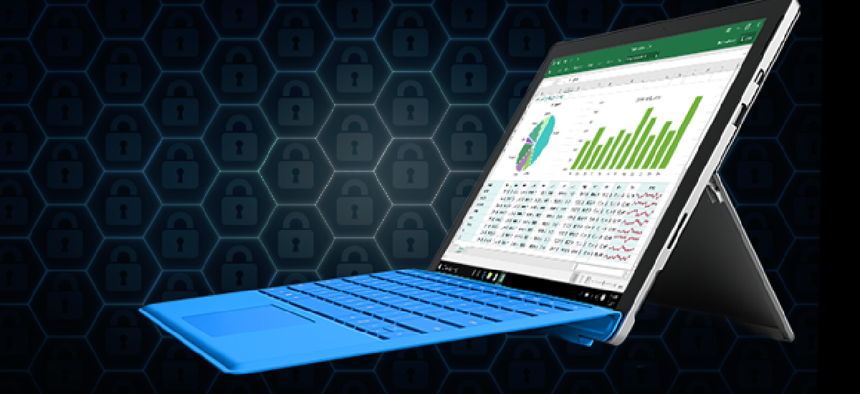Partnership aims for end-to-end security for Surface devices


Connecting state and local government leaders
Booz Allen Hamilton will be working with Microsoft to develop a single dockable product that workers can use like a desktop or or mobile device without losing any compute power or security.
Booz Allen Hamilton will be working with Microsoft to develop security software for the computer giant’s portable Surface products for government users.
The partnership, announced last month, enables Booz Allen employees to work directly with Microsoft Surface, Windows 10, hypervisor, security and other teams on end-to-end secure compute platforms that serve the government community. The idea is to create a single dockable device that workers can use like a desktop or laptop but also can easily take with them without losing any compute power or security.
“Most government workers right now have their desktop computer -- it has a certain operating system on it, and then they have a tablet that they carry around. So our government agencies are having to build and maintain two, sometimes three different platforms,” said Walton Smith, a Booz Allen vice president who leads the company’s Internet of Things practice. “Network security differs from a desktop to a laptop to a tablet to a phone, and we think that has limited some of the functionality.”
Multiple devices also means higher costs, he added. A single device cuts total cost of ownership because agencies can reduce the expense of maintaining desktops, laptops and tablets, each with its own operating system and security requirements.
“We’re pushing and working with Microsoft to have one solution that enables you to dock when you want multiple screens, to be able to get up and walk to a meeting as well as to [work at] home,” Smith said. The goal is to securely and seamlessly give users the right information at the right time.
Booz Allen is taking advantage of the built-in security of the Windows 10 platform that Surface devices -- and many other systems -- use. Touted as the most secure Windows iteration so far, it uses secure booting and virtualization-based security that creates “an isolated, hypervisor-restricted, specialized subsystem for storing, securing, transferring and operating other sensitive subsystems and data,” according to a March 15 InfoWorld article. Windows 10 also uses Windows Hello, which aims to eliminate passwords and supports biometric authentication, and Microsoft Passport, which enables single sign-on.
The company is not only leveraging the Windows 10 platform, but also working to overlay identity verification apps, such as location-based data or information about individual users’ personal attributes. “If we can identify and secure the user – because the user is the weakest link in any kind of application – we think we can provide the beginnings of an end-to-end security solution,” Smith said.
And because the applications Booz Allen is working on are compatible with Windows 10, they can be rolled out across the many different devices it powers.
Besides security, user experience is also an important part of the partnership, Smith said. Workers want to have a sleek device with a long battery life that they can use at home or in the office. And agencies want to be able to secure both information and the devices it’s on.
“Agencies…want to put the right security in place, as opposed to granting waivers for folks to be able to get around the systems, and so we’re looking to provide that core security,” he said. “We think that’s what our users expect.”
This is not Booz Allen’s first partnership with Microsoft. The company built solutions for the Surface Pro 2, for example, Smith said, adding that the close collaboration is crucial to success.
Being able to work directly with Microsoft – to see where they’re going, what they’re doing – is key to understanding the technology and building a solution, he said.




